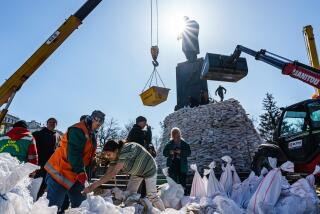A Giant Headache for Mother Russia : Soviet Union: An intellectual boost to nationalistic soundings cannot give much comfort to Gorbachev--or others.
- Share via
Spectacular developments on the periphery of the Soviet empire have, until recently, obscured the rise of Russian nationalism. Yet ethnic unrest in the Russian Soviet Federated Socialist Republic may well grow into the biggest headache yet for Mikhail S. Gorbachev.
Early warning signs cropped up two years ago when the ultra-nationalist organization Pamyat blamed the country’s ills on “the Judeo-Masonic conspiracy.” The group didn’t make much headway then (its candidates lost in last year’s elections for the Congress of People’s Deputies), mainly because it failed to attract support from the Russian intelligentsia. Now the situation has changed.
Igor Shafarevich, a world-renowned mathematician and respected dissident, is one prominent Soviet intellectual who has lent his authority to the nationalist cause. His provocative essay, serialized in the literary magazine Nash Sovremennik, begins with the unobjectionable premise that ethnic Russians are entitled to national pride just as any other ethnic group. He rejects as russophobic any attempts to explain Russian history in terms of servility, intolerance and a craving for strong authority, pointing out--correctly--that any such charge addressed to other groups would be judged racist.
Inexplicably, however, Shafarevich refuses to follow his own advice and proceeds to blame Jews for the misfortunes that Russia has suffered in this century. His arguments are as old as they are spurious: The dominant role that Jews gained in revolutionary organizations at the turn of the century caused Russia to abandon its predestined historical path; after the revolution, Jews effectively controlled repressive institutions in the country; the horrors that Russian people suffered under the Marxist regime are due largely to vengeful sentiments imparted to Jews by the Talmud.
“Either remain foreigners without political rights,” counsels Shafarevich to the “non-indigenous” elements residing in Russia, “or accept Russian citizenship based on love of homeland.”
One finds among the intellectuals who have caught the chauvinistic bug the names of prominent current writers such as Valentin Rasputin, Vladimir Soloukhin, Vasily Belov and Vadim Kozhinov. On various occasions, these authors have intimated the need to purge political, social and artistic institutions in the Russian republic from alien influences.
Uri Bondarev, the powerful secretary of the Russian republic’s Writers’ Union, charged last fall that Russian writers are being pushed to the edge in their own land. Liberal magazines such as Ogonyok, Neva and Zvezda, he said, give far too much space to non-Russian writers; it is time for ethnic Russians to claim supremacy in the affairs of their own republic.
One after another, speakers at the union’s plenary meeting rose to condemn “cosmopolitan intellectuals” and swore to stamp out their pernicious influence. Some thanked Shafarevich for “the courageous stand” he took in the face of Jewish dominance. Anatoly Builov went further than anybody else in his avowed anti-Semitism: If life in the Soviet Union has been miserable for so many decades, he asked, wasn’t it because so many Jews, some hiding under Russian identities, have occupied leading positions in the Soviet hierarchy?
The ethnic purity espoused by Russian ultra-nationalists smacks of racism. Alexander Pushkin, a Russian literary icon, was descended from an Ethiopian slave brought to Russia by the Peter the Great. Boris Pasternak, the author of “Dr. Zhivago,” was a Jew. Osip Mandelshtam, arguably the greatest Soviet poet, also was a Jew. Can anybody deny their contribution to Russian culture?
Russian nationalism is not tenable as a political movement, particularly when it is fastened to dormant anti-Semitism, which is bound to breed racial hatred and violence.
Whatever the future of Russian nationalism, its immediate prospects are unsettling. The situation in the country brings to mind Germany in the waning years of the Weimar Republic, where the populace, worn down by an economic malaise and political uncertainty, cast about for scapegoats and clamored for a Fuehrer to spur the nation toward better times. We know what happened next: Hitler, the Holocaust, World War II.
Those who think that the true legacy of Russian intelligentsia is not a quest for racial purity but a heightened capacity for compassion had better speak out now.
More to Read
Sign up for Essential California
The most important California stories and recommendations in your inbox every morning.
You may occasionally receive promotional content from the Los Angeles Times.













